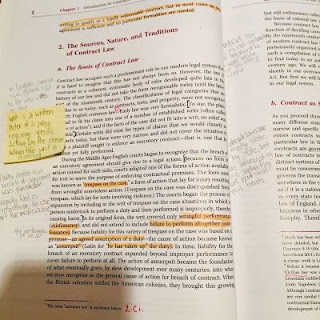Advice from Professors
For the final day, we recapped over book briefing, case briefing (IRAC), and outlining. One professor mentioned that although it's not against the rules in any way to use someone else's outlines or dividing outline responsibilities within a study group, that won't always be helpful because the importance of these is in what you learn as you figure out what to go in it. He also warned that every year there's at least one person that asks a question about a topic during a review session, and the professor didn't even teach on that topic so essentially that student wasted their timing learning something that was't even on the test. He suggested looking at them for help when you get stuck rather than just skipping the homework since you already have the answers. I was having PNM flashbacks again to when everyone was three steps ahead of me because family and their friends had already gone through this process and were helping them along the way; meanwhile I'm sitting here clueless and oblivious and helpless. This guy in my area said he even had his grandpa's outlines! That's just crazy to me.Also, the Assistant Dean gave us some good advice about what to ask mentors. Namely, to ask what they really like and strongly dislike about their jobs. And if things go well, network through them and ask if they know of 1-2 other attorneys that you can speak to.
Questions to Answer
We also watched the opening scene of The Paper Chase to show the simple questions to be prepared to answer in class such as:- What happened in the case?
- Who was suing who and why?
- What was decided by the case?
- Why the judge used a rule
- How a judge used a rule
And also what questions to ask yourself after class as you fill out your outline such as:
- What are the black letter rules and definitions that you will be responsible for on the final exam?
- How did your professor break down the elements of these definitions and how did your professor define the terms within the definitions?
- What facts did your professor use to apply the various definitions and what legal arguments were presented when discussing each definition?
- What aspects of the material covered today do you still not understand?
A 3L explained how he would write his briefs in blue pen, (it's said to help you retain information better) and take class notes on the side in black pen. This helped him from rewriting in class notes what he had already written in his briefs, and also allowed him to see what the difference was between his notes on the book and what the professor had to say.
Outlining
This is the broadest form of notes and allows you to study your notes instead of re-reading the books for the exams. Book briefing is the marginal notes/ highlighting/ underlining that you do in your book, which you use to fill out your IRAC brief, which you use to make your outline. Ideally, you will have an outline for a specific case, an outline for a specific chapter, and an outline for the class as a whole. Broken down, it looks like this:
Specific Case Outline
- Servant
- definition (elements that must be proven)
- one
- two
- three
- examples
- A hires B to help him wash his car
- B is A's servant
- These will be hypothetical questions that your professor brings up in class
- Tort Liability
- Respondeat Superior
- an employer or principle is liable when....
- Principal's Tort Liability
- one
- two
- three
Chapter Outline
- Agency
- Who is an agent
- Liability of principal to the third party in a contract
- Liability of principal to third parties in tort (this is the above example)
- these will be headings and subheadings in the table of contents
Class Outline
- Agency (above example)
- Partnerships
- Corporate Debt
- these should be organized according to the syllabus and your professor's order rather than in the order of the table of contents























0 comments:
Post a Comment